The future for Christians in the Middle East, the birthplace of Christianity, has been bleak, some say, for more than a century.
The exodus of Christians from the region has been attributed to a number of factors, persecution and conflict among them. The U.K.’s former foreign Secretary Jeremy Hunt ordered a report published in 2019 that found that since the U.S. invasion of Iraq in 2003, the Christian population had fallen from 1.5 million people to less than 120,000 in the country.
“Evidence shows not only the geographic spread of anti-Christian persecution, but also its increasing severity,” the Bishop of Truro the Right Reverend Philip Mounstephen, who led the report, wrote.
While Americans headed to the ballots on Nov. 3 to decide who would become the next president, Christians in the Middle East and their American allies watched with an acute awareness of how each respective candidate’s foreign policy and humanitarian aid priorities could impact their uncertain futures from an ocean away.
Now, they’re looking at President-elect Joe Biden for indications of how his policies will shape their futures.
Civilians overseas are familiar with Biden because of his tenure as vice preisdent in the Obama administration. There’s an understanding that his victory over Donald Trump may mean more Christians resettling in the U.S. as refugees, advocates say, allowing them religious freedoms that were threatened in their home countries by ISIS and other extremists. But it may also mean that persecuted Christians will return to no longer being a priority or consideration in international aid decisions.
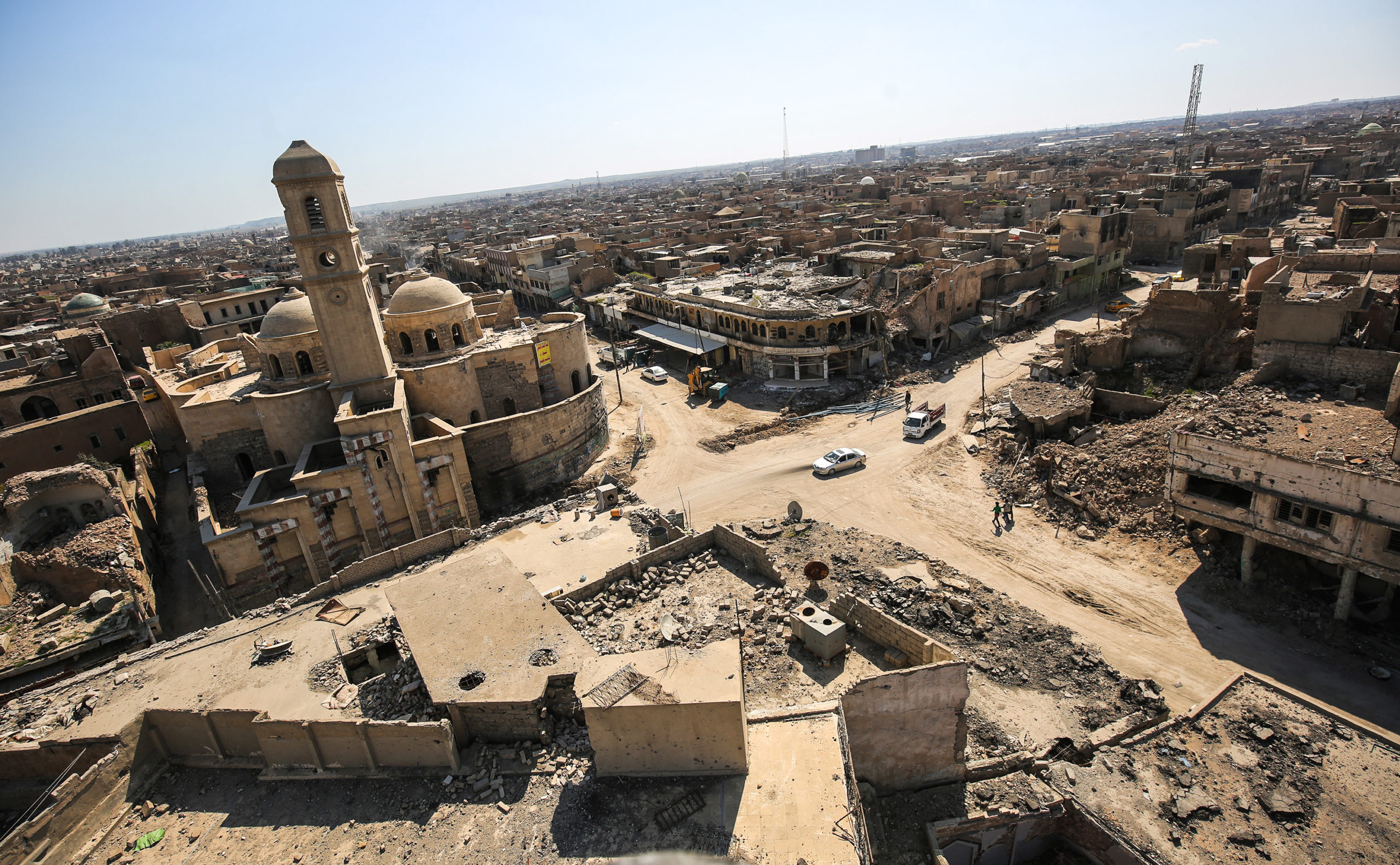
A picture taken on March 14, 2018 shows a view of destruction surrounding the Roman Catholic Church of Our Lady of the Hour (L) in the old city of Mosul, eight months after it was retaken by Iraqi government forces from the control of Islamic State (IS) group fighters. (AHMAD AL-RUBAYE/AFP via Getty Images)
Father Benedict Kiely, a Catholic priest who devoted his ministry to aid the persecuted Christians in the Middle East, traveled to Iraq numerous times, visiting what’s left of the country’s Christians. Kiely told the Daily Caller that while visiting the camps in Erbil prior to the Trump’s election in 2016, the residents expressed a desire for Trump to win.
“The evidence is that the last Democratic administration was not helpful at all to persecuted Christians,” he said. “In fact, it was almost hostile. They believed that based on their experiences, the Obama administration has been no use to them whatsoever.”
Kiely also pointed to the Obama administration’s reluctance to call attention to the plight of Christians and other ethnic minorities in the Middle East. Kirsten Powers criticized the Obama White House in USA Today in 2016, noting all of the leaders and global organizations, including the European Parliament and former Secretary of State Hillary Clinton, who called the persecution a genocide while Obama and his representatives “refused to embrace the word” at the time.
Christians in Iraq have faced multiple episodes of genocide over the last century, most recently at the hands of ISIS, which killed Christians as they worshipped in church, often marking their homes with the Arabic letter “N” which meant “Nasrani”, or Christian. ISIS destroyed some of Iraq’s ancient Christian sites like Dair Mar Elia, the oldest monastery in the country, in its campaign. In Mosul, most churches within the city were destroyed.
The persecution did not begin in the 21st century. In 1915, 1.5 million Armenians, Assyrians, Chaldeans, Greeks and other Christian minorities were systematically massacred by the Ottoman Turks in what a near consensus of historians and academics have declared to be a “genocide.”
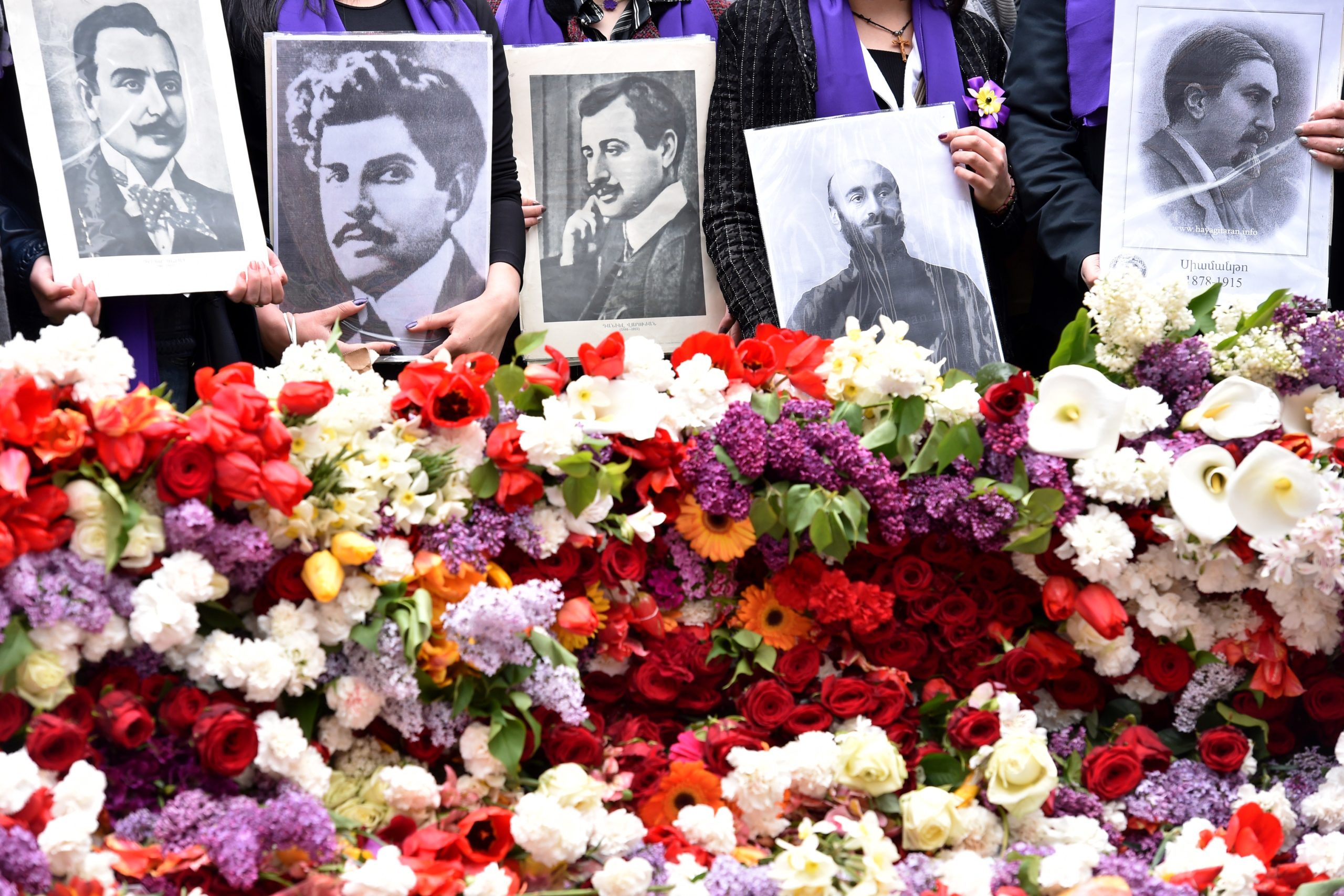
People holding photographs of (L-R) Armenian writer Krikor Zohrab, Armenian poet Ruben Sevak, Armenian poet Daniel Varoujan, Armenian priest and composer Komitas and Armenian writer Siamanto, who were among the Armenian intellectuals arrested by Ottoman forces in 1915, attend a flower laying ceremony at the Tsitsernakaberd Memorial, on April 24, 2015 in Yerevan, as part of the Armenian genocide centenary commemoration. (KIRILL KUDRYAVTSEV/AFP via Getty Images)
In northeastern Syria, Christians had their churches destroyed by ISIS, and in 2015, more than 220 residents were kidnapped and held captive for exorbitant ransoms, the New York Times reported. As in Iraq, most Christians in Syria have fled their ancestral homes for countries like the U.S., Germany and Australia. In Egypt, Coptic Christians report facing persecution at all levels of society, both from jihadists but also from their neighbors.
Without massive interventions, Christianity could disappear from Iraq within 5 years, a research paper commissioned in 2017 by the U.K. Department for International Development explained.
Stephen Rasche, like Kiely, has worked closely with Christians in the Middle East, traveling in and out of Iraq since 2007 as an international transactions lawyer. During that time, he became familiar with the Christian community in northern Iraq and met Archbishop Bashar Warda, the Chaldean Catholic Archbishop of Erbil, in 2010.
When Rasche began helping on a pro bono basis, the Archbishop had more than 3,000 displaced families who fled violence in southern Iraq. Most of them had escaped persecution, he told the Caller.
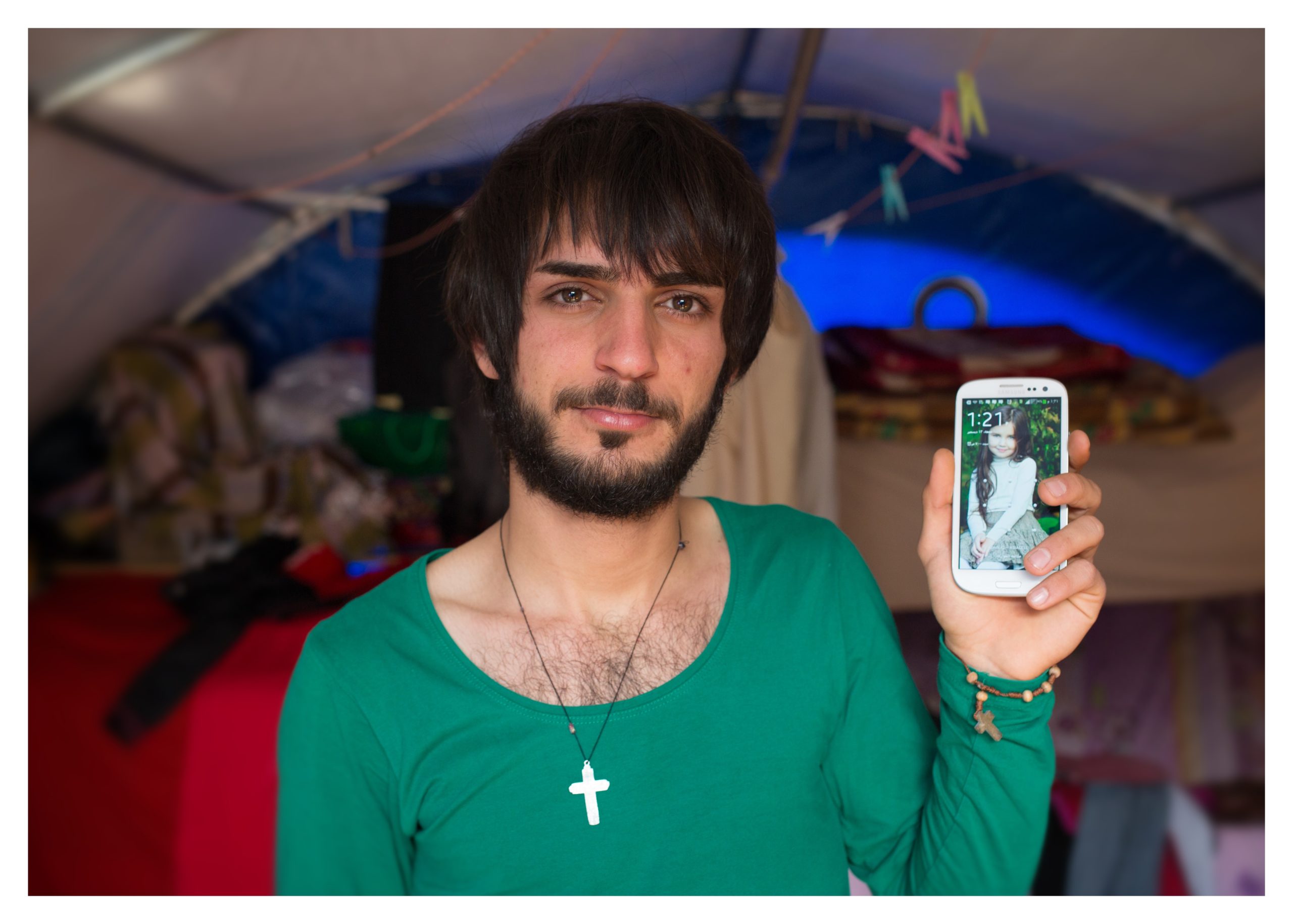
ERBIL, IRAQ – DECEMBER 13: Iraqi Christian Anas Khaleel poses for a photograph in his tented home erected in the grounds of Mazar Mar Eillia (Mar Elia) Catholic Church, that has now become home to hundreds of fellow Iraqi Christians who were forced to flee their homes – many with less than an hour to do so – as the Islamic State advanced earlier this year, on December 13, 2014 in Erbil, Iraq. (Photo by Matt Cardy/Getty Images)
In 2014, Rasche began to help the church care for the displaced, and in March 2020, he wrote a book called “The Disappearing People: The Tragic Fate of Christians in the Middle East,” which focuses on the causes of the massive exodus.
“The basic premise of the book was that we had, in the Christians of Iraq, and also the Yazidis, ancient peoples who were on the verge of ‘disappearing’ in their ancestral homelands, and that this disappearance was not a natural migration, but the result of centuries of sustained and systemic persecution, in which the ISIS terror was but the latest occurrence,” Rasche said.
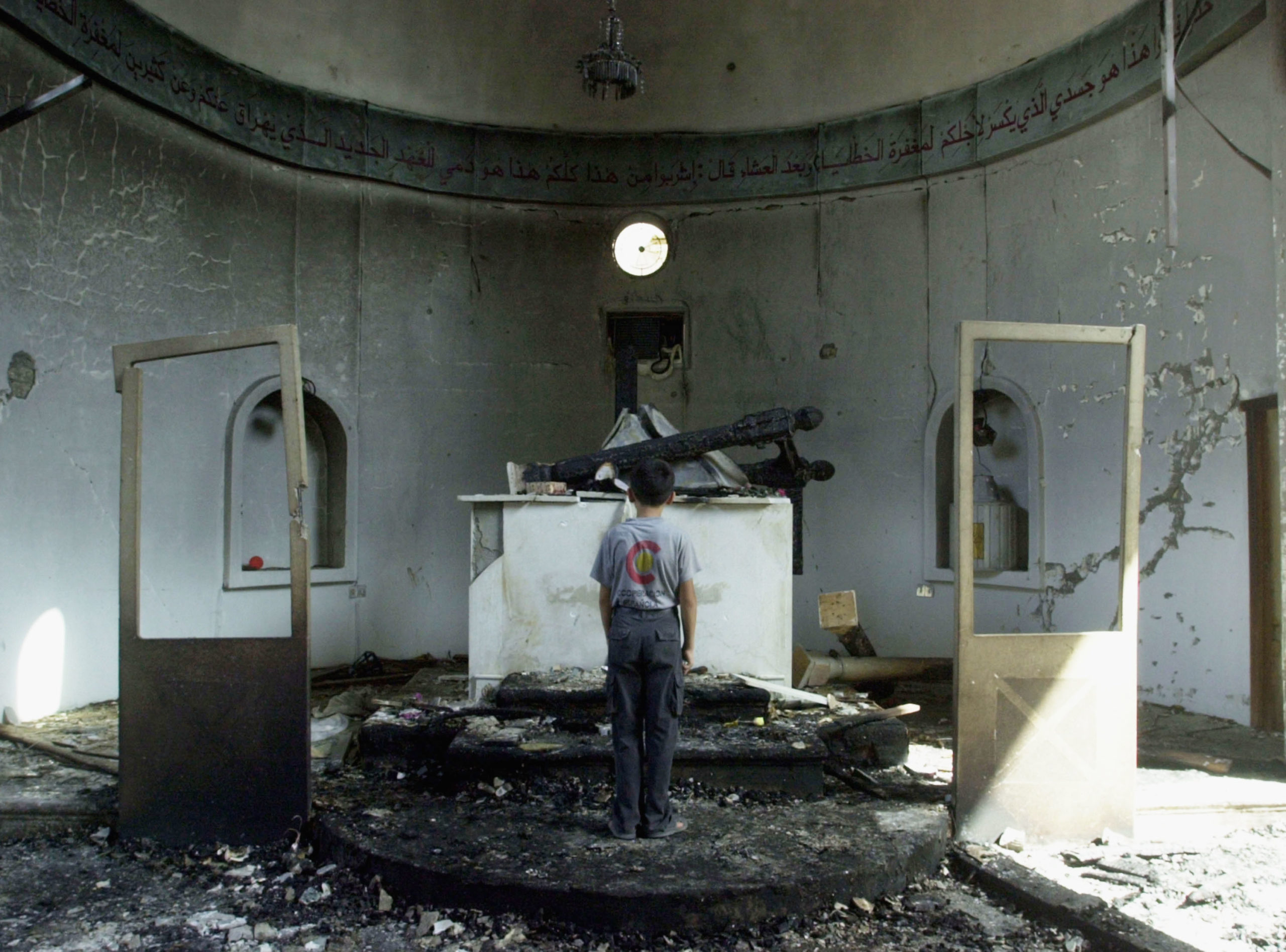
BAGHDAD, IRAQ – OCTOBER 16: Iraqi Christian children pray October 16, 2004 inside the church of St Rum’s in the Karradh neighbourhood in Baghdad, Iraq. Five Christian churches were attacked early Saturday in Baghdad but no causalities have been reported according to the Iraqi police. (Photo by Muhannad Fala’ah/Getty Images)
Rasche became familiar with the U.S.’s mode of humanitarian aid distribution during the Obama administration, which was primarily done through the United Nations (UN). The United States Agency for International Development (USAID) was closely tied to the UN. He claimed, however, that the aid to Christian communities through the UN was disjointed and counterproductive.
“Reports were being compiled and decisions made which bore no relation to the reality on the ground, with the result that US aid policy, as implemented through the UN, was unquestionably hastening the demise of the religious minorities rather than helping,” he said.
Additionally, the Christian communities in Iraq had no say in aid decisions, which were decided by professionals in Washington, D.C., and elsewhere who were not responsive to this community’s pleas, Rasche claimed in his book.
On the heel of the Trump administration, Christians and Yazidis are still in the crosshairs of an ongoing battle between USAID and the State Department as to whether local faith-based entities should play a role in deciding what is done with aid in their own communities, he added.
Advocates of persecuted Christians have claimed that the Obama administration rarely afforded leaders from these communities the opportunity to explain their circumstances and how the U.S. could play an effective role in alleviating them. The UN aid was often rebuked as “cosmetic projects” rather than an impactful resource.
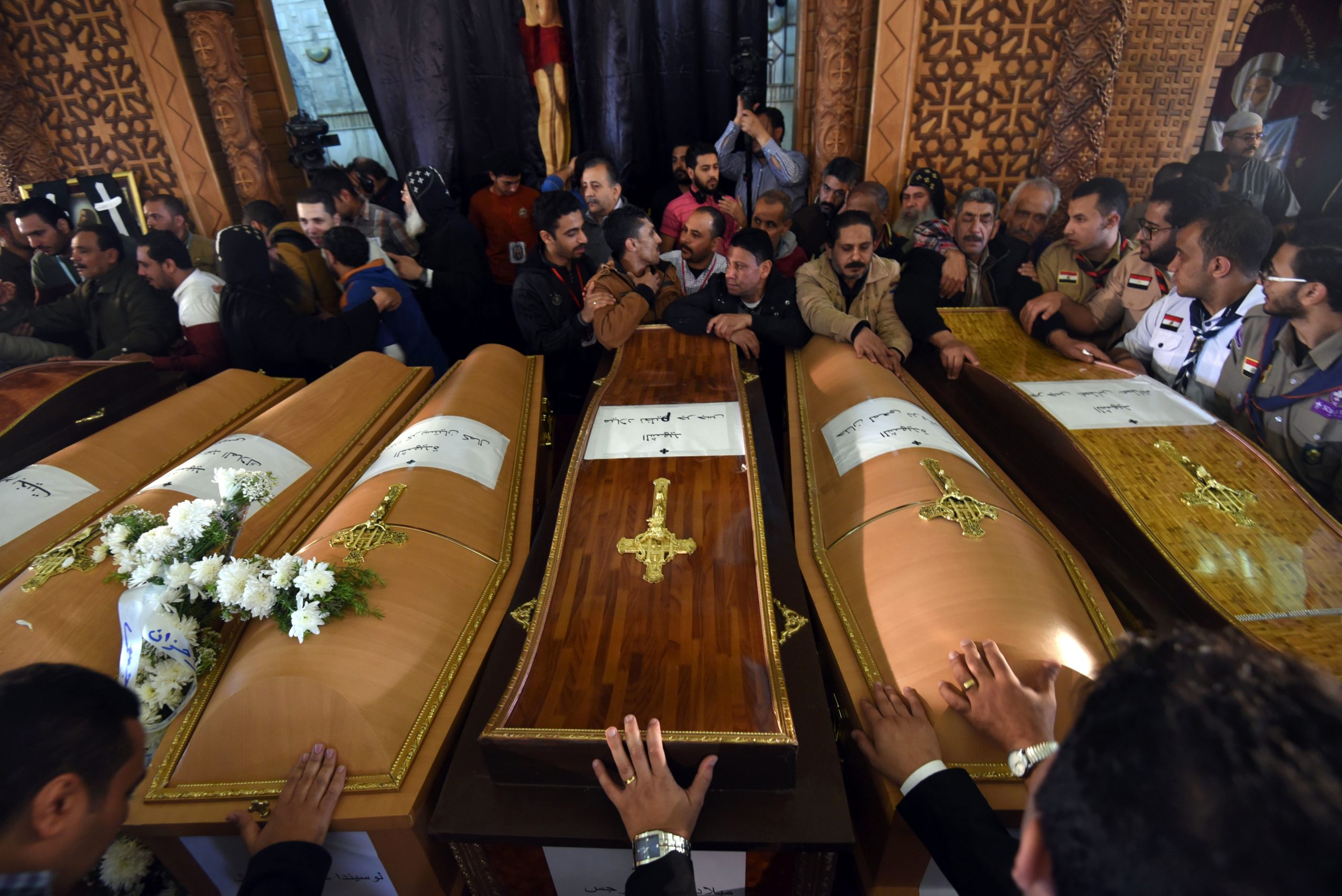
Mourners pray next to coffins of the victims of the blast at the Coptic Christian Saint Mark’s church in Alexandria the previous day during a funeral procession at the Monastery of Marmina in the city of Borg El-Arab, east of Alexandria on April 10, 2017.
(MOHAMED EL-SHAHED/AFP via Getty Images)
The Trump administration, however, regularly brought up the plight of Christians in the Middle East. In 2017, Mike Pence announced that the administration would direct aid away from the UN and to USAID, adding in a message that “help is on the way.”
Gia Chacon, the founder of March for the Martyrs, a nonprofit that provides aid to persecuted Christians, also commended the Trump administration for giving the issue of Christian persecution a platform, and pointed to Trump’s 2019 Global Call to Protect Religious Freedom as among the examples. (RELATED: Humanitarian Organizes ‘March For The Martyrs’ To Bring Attention To Neglected Persecuted Christians)
“Persecuted Christians are in need of world leaders that will not only be their voice, but will also make a consistent effort in protecting them against extremism,” she told the Caller. “I fear that a Biden-Harris Administration would be even more apathetic toward suffering Christians than the Obama Administration.”
The Biden-Harris campaign did not call attention to the topic of Middle Eastern Christians to the degree that Trump and Pence did, leading advocates to base their predictions off of the Obama administration’s performance. The transition team did not respond to an inquiry about their plans to address it.
While the Trump administration was more vocal about the indignities the persecuted face, the administration was criticized by some advocates of Middle Eastern Christians for its immigration policies, which made it difficult or impossible for those seeking refuge in the U.S. to gain entry.
The Trump administration announced in 2019 that it would slash the number of resettled refugees to 18,000, down from the previous 30,000 limit. The 30,000 limit, which was announced in 2018, was the lowest ceiling a president had placed on the refugee program since 1980. During his last year of office, the Obama administration said that 110,000 refugees should be allowed into the country.
Trump’s immigration policy may have also shifted some Iraqi Christians from voting for him in 2020. In 2016, Trump narrowly won Michigan, a feat some say was possible because of the Chaldean community’s support.
After deportation raids following Trump’s executive order that barred admission to the U.S. for Iraqis, Trump announced in 2020 that he would offer relief from the deportations while giving a speech in Michigan, where a large population of Christian Iraqis live. It was too late, however, for Jimmy Aldaoud, a diabetic Chaldean Catholic who came to the U.S. as an infant from a refugee camp and was deported to Iraq after being sentenced for drug possession charges. He died a month later in 2019 due to a lack of insulin. Some believe that the deportations pushed some Chaldeans away from Trump in his run for reelection.
Biden, however, promised to revoke the travel ban, which impacted citizens of 13 Muslim-majority countries, some of which have Christian populations who have faced growing threats of violence. Biden also vowed to recognize the Armenian Genocide if elected president — something no president has done since Ronald Reagan. On Armenian Genocide Remembrance Day in April 2020, he noted the efforts he led while in the Senate to recognize the genocide of the majority Christian Armenians.
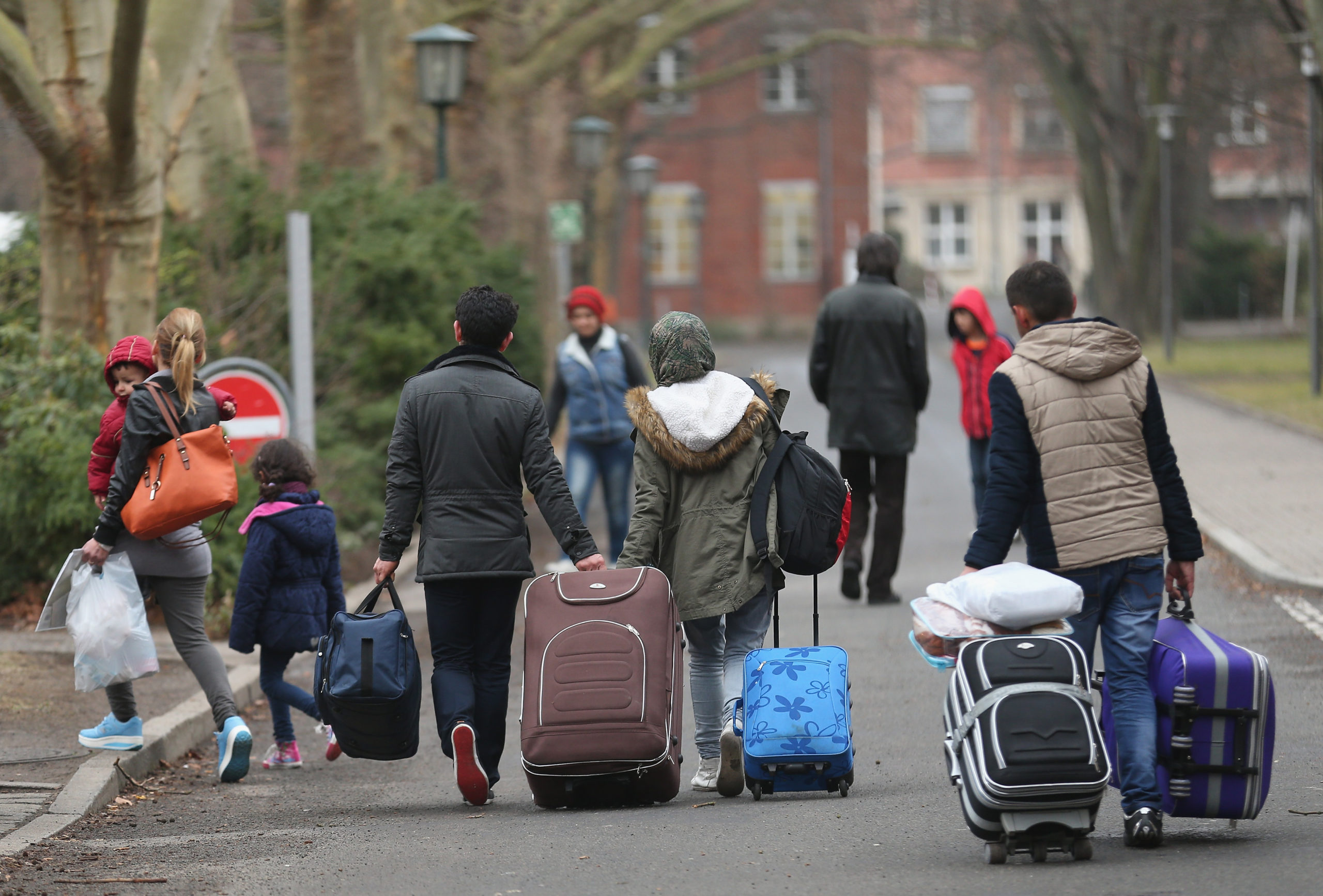
BERLIN, GERMANY – MARCH 11: People pulling suitcases arrive at the Central Registration Office for Asylum Seekers (Zentrale Aufnahmestelle fuer Fluechtlinge, or ZAA) of the State Office for Health and Social Services (Landesamt fuer Gesundheit und Soziales, or LAGeSo), which is the registration office for refugees and migrants arriving in Berlin who are seeking asylum in Germany, on March 11, 2015 in Berlin, Germany. (Photo by Sean Gallup/Getty Images)
Steven Howard, the National Outreach Director of In Defense of Christians, a Washington-based advocacy group that works to preserve Christianity in the Middle East, told the Caller that to help persecuted Christians the most, an incoming Biden administration should adopt a “consensus approach.”
“Data from World Relief indicates a 90% decrease in the resettlement of persecuted Christians to the U.S. over the past four years,” he told the Caller. “President-elect Biden would do a great deal to help persecuted Christians by getting refugee resettlement numbers back to the Obama-administration numbers and also continuing the Trump-administration approach of direct aid to genocide survivors.”
“There are good lessons to learn from both Democratic and Republican administrations on these issues and our hope is that the president-elect will take a consensus approach to addressing this issue,” he added.
Kiely echoed Howard’s remark on the decrease in resettlement. “Under the Trump administration, unfortunately, Christians have also suffered due to travel ban,” Kiely noted, referring to a Trump-era travel ban that included several Muslim-majority countries, among them Syria, where a significant population of Christians live.
“We should have had thousands of Syrian Christians come in during the Obama years.”
During the Obama administration, many called attention to the scant number of Christians that were accepted as refugees. Elliott Abrams wrote in Council on Foreign Relations that out of 10,801 Syrian refugees, only 56 were Christians. While the Christian population is a minority, the number was not proportional with the statistic showing that Christians made up 10% of all Syrians, Abrams wrote in 2016.
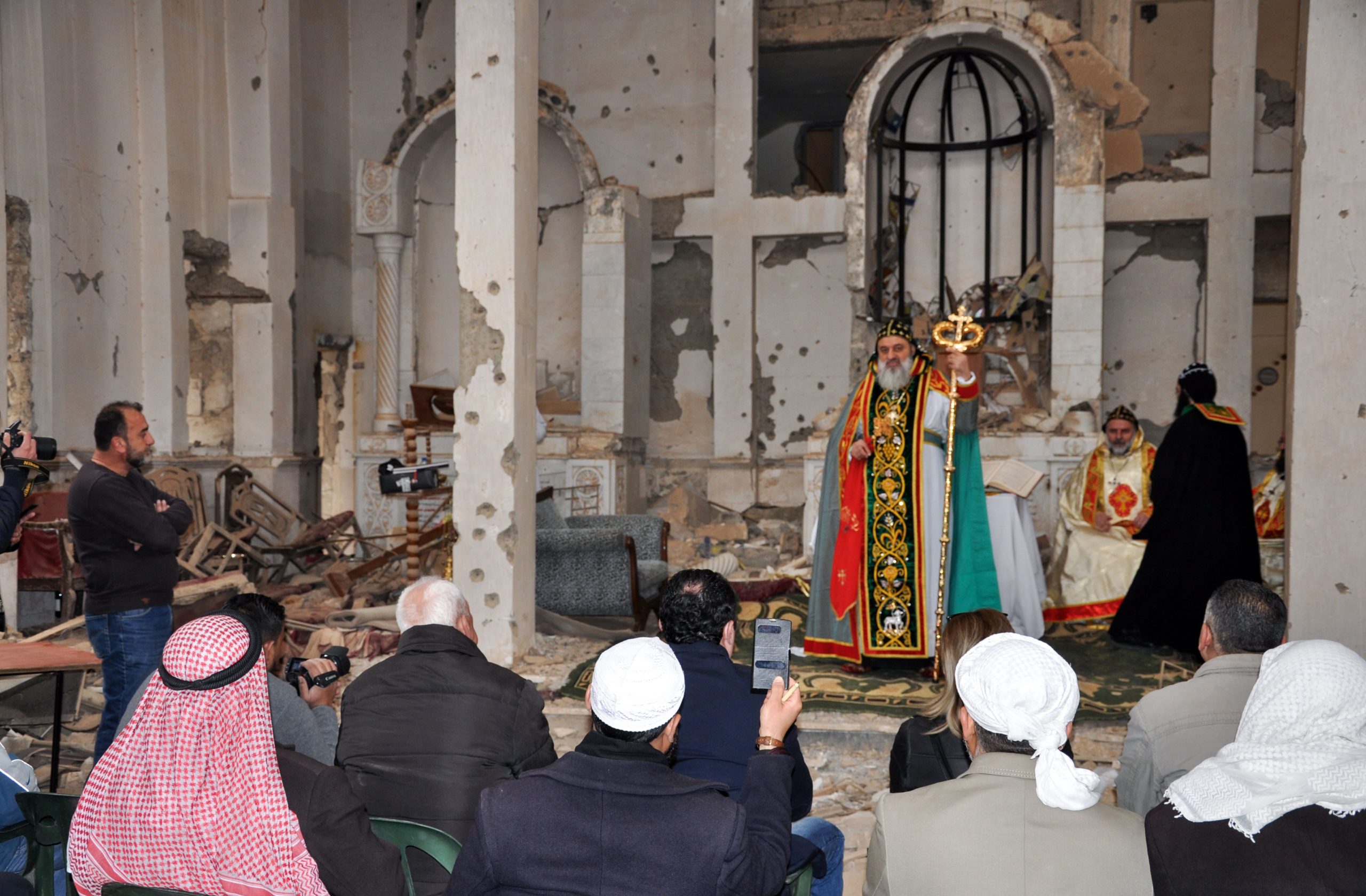
Syriac Orthodox Patriarch of Antioch, Ignatius Aphrem II, gives a sermon during mass at the heavily damaged Syriac Orthodox church of St. Mary in Syria’s eastern city of Deir Ezzor on February 3, 2018. (AYHAM AL-MOHAMMAD/AFP via Getty Images)
“Somewhere between a half million and a million Syrian Christians have fled Syria, and the United States has accepted 56. Why?”
Advocates also looked to Biden’s appointments as bellwethers of his stance toward Middle East Christians. Biden appointed Antony Blinken, who served as deputy secretary of state during the Obama administration, to lead the State Department. He would replace Secretary of State Michael Pompeo, who was outspoken about religious freedom abroad throughout his tenure, and described religious freedom as a “foremost” right.
During a 2016 presentation of an annual report detailing the status of global religious freedom, Blinken said that “support for religious liberty guides the United States and our foreign policy every single day.”
Some religious freedom advocates and public officials disputed the claim. Republican Oklahoma Sen. James Lankford sent a letter to Secretary of State John Kerry in 2015 questioning the administration’s commitment to promoting international religious freedom.
“The world has seen the priority placed on issues like climate change and women’s health by this Administration and the status of those positions within the State Department are a direct reflection of those priorities,” Lankford wrote. “However, regarding religious freedom, actions do not reflect words.”
Rasche told the Caller that the Christians in Iraq will continue looking for a signal from the prospective Biden administration about what path it will take in the next few years.
“I can assure you this is being watched very closely within these communities, and should there be a sense that their voices and place are being set aside again, it is very likely that large numbers of them will give up for good and flee into the diaspora.”


